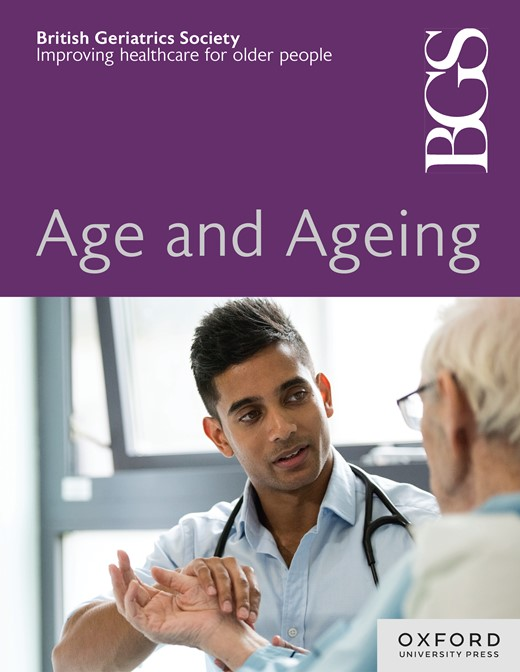3171 Better mealtimes for people living with dementia in care homes: a feasibility study
IF 7.1
2区 医学
Q1 GERIATRICS & GERONTOLOGY
引用次数: 0
Abstract
Introduction Some people living with dementia have difficulties at mealtimes, with significant implications for physical and mental health (Abdelhamid et al., 2016). Care home staff provide direct care at mealtimes (Skills for Care, 2015), but there is a shortage of high-quality dementia care training focusing on mealtimes (Fetherstonhaugh et al., 2019). This study tested the feasibility and acceptability of an evidence-based training programme promoting better mealtime care for people living with dementia (Faraday et al., 2022). Method The study comprised a before-and-after design using multiple methods of data collection and analysis. The qualitative arm of the study is reported here. The training programme was delivered in three care homes in the UK, chosen for differences in context, size and ownership. Trainees were recruited from a range of different roles across the homes, including care staff, kitchen staff and management staff. After training, participants attended focus groups to elicit views on their experience of the training and suggestions for improvement. Data from the focus groups were analysed using reflexive thematic analysis (Braun & Clarke, 2022). Results Analysis to date has generated five themes: Need a mix of experience in the room; More dementia-specific content; Make the most of group discussions; Scenarios should be nuanced and complex; One-day delivery is easiest; Facilitator experience and skill outweighs profession. These themes will inform modification of the training programme’s content and format, to increase its acceptability and usefulness to care home staff, prior to wider roll-out and evaluation. At the same time, a short animation has been co-produced with experts by experience to convey key messages from the training as accessibly as possible (https://vimeo.com/1009856313). Conclusion(s) This study has reduced uncertainty about the training programme’s acceptability, so that it is more likely to become embedded in practice and improve mealtime care for people living with dementia.3171改善老年痴呆症患者的用餐时间:一项可行性研究
一些痴呆症患者在吃饭时有困难,这对身心健康有重大影响(Abdelhamid et al., 2016)。养老院工作人员在用餐时间提供直接护理(护理技能,2015年),但缺乏以用餐时间为重点的高质量痴呆症护理培训(Fetherstonhaugh等人,2019年)。本研究测试了一项以证据为基础的培训计划的可行性和可接受性,该计划可促进痴呆症患者更好的用餐时间护理(Faraday et al., 2022)。方法采用多种方法进行资料收集和分析,采用前后对照设计。这里报告了该研究的定性部分。该培训项目在英国的三家养老院进行,选择这三家养老院的背景、规模和所有权都存在差异。受训者被从不同的岗位中招募,包括护理人员、厨房工作人员和管理人员。培训结束后,参与者参加焦点小组,听取他们对培训经验的看法和改进建议。使用反身性主题分析(Braun &;克拉克,2022年)。迄今为止的结果分析产生了五个主题:需要在房间里混合经验;更多针对痴呆症的内容;充分利用小组讨论;场景应该微妙而复杂;一天送达最简单;主持人的经验和技能比专业更重要。在更广泛的推广和评价之前,这些主题将为修改培训方案的内容和形式提供信息,以提高其对护理院工作人员的可接受性和实用性。同时,还与经验丰富的专家共同制作了一个短片,尽可能方便地传达培训的关键信息(https://vimeo.com/1009856313)。结论:本研究减少了培训计划可接受性的不确定性,因此更有可能融入实践,并改善痴呆症患者的用餐时间护理。
本文章由计算机程序翻译,如有差异,请以英文原文为准。
求助全文
约1分钟内获得全文
求助全文
来源期刊

Age and ageing
医学-老年医学
CiteScore
9.20
自引率
6.00%
发文量
796
审稿时长
4-8 weeks
期刊介绍:
Age and Ageing is an international journal publishing refereed original articles and commissioned reviews on geriatric medicine and gerontology. Its range includes research on ageing and clinical, epidemiological, and psychological aspects of later life.
 求助内容:
求助内容: 应助结果提醒方式:
应助结果提醒方式:


